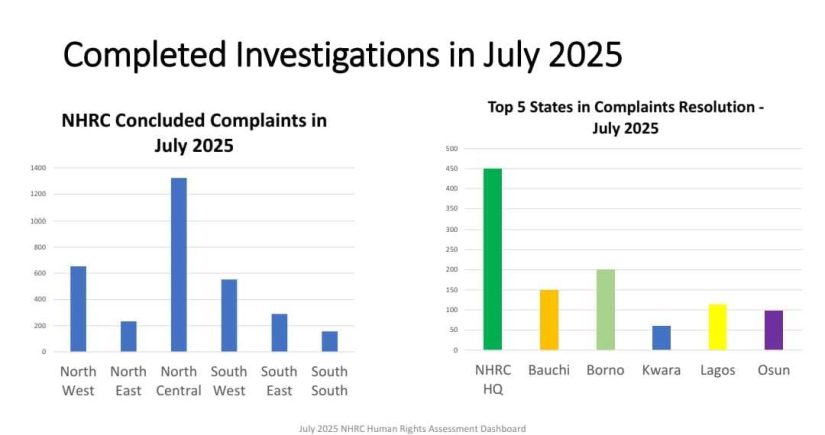
Daniel Otera
In Nigeria’s ongoing struggle with insecurity, community vigilante groups have become crucial partners in efforts to maintain local safety. However, as they step into these dangerous roles, they are increasingly targeted by criminal groups, and their vulnerabilities continue to rise.
The latest data from the National Human Rights Commission (NHRC) underscores this grim reality, revealing that vigilantes suffered the highest casualties in July 2025, with 97 fatalities recorded amid a broader tally of 375 killings nationwide. This figure, while marking a 45 percent decline from June’s killings, highlights a persistent vulnerability that threatens the fabric of local defence mechanisms. According to the NHRC’s monthly observatory report, presented by Senior Human Rights Adviser Hilary Ogbonna at the commission’s headquarters in Abuja on Tuesday, these deaths are not mere statistics but signal systemic failures in security, justice, and accountability.
The report paints a detailed picture of July’s violence, categorising fatalities to expose the multifaceted nature of Nigeria’s security challenges. Beyond the 97 vigilante deaths, 30 farmers and 11 children were killed, alongside 38 deaths from accidents, 34 cult-related incidents, and 13 faith-based killings. Kidnappings also persisted, with 98 cases documented, often linked to banditry and cult activities.
Mr. Ogbonna emphasised that acts of violence by cultist groups and the targeting of law enforcement agents by bandits contributed significantly to these numbers. “July represents the deadliest month for vigilante groups in the country, with nearly 100 fatalities,” he stated during the presentation.
This focus on vigilantes comes amid broader trends that show an escalation in risks for these informal security providers. While there have been numerous violent confrontations between vigilante groups and bandits across Nigeria, the situation in Katsina State remains particularly alarming. For instance, in February 2023, a deadly clash between a local vigilante group and bandits in the Bakori Local Government Area of Katsina resulted in the deaths of at least 41 individuals. The bandits had attacked the village, stolen livestock, and retreated into the bush. A vigilante group mobilized to recover the stolen animals, only to be ambushed by the bandits, leading to the tragic loss of life. This incident highlights the growing tension between vigilantes and criminal elements in the region, with local security forces playing an increasingly critical role in community safety.
In February 2024, another violent clash occurred in the area between a joint task force and bandits in Yar Tepa, Birdigau, located between Malumfashi and Kankara Local Government Areas. The confrontation resulted in the deaths of Sanusi Hassan, the Katsina Community Watch Commander for Kankara LGA, four local vigilantes, and two young men from Birdigau ‘K’ and Gidan Gwanji. On the bandits’ side, more than 20 individuals were killed during the exchange. This incident further underscores the perilous position of vigilante groups, who continue to face mounting risks in their efforts to maintain security in the face of increasingly organized criminal violence.
These incidents exemplify the escalating violence in Katsina State, where vigilante groups, though integral to local security, are exposed to significant danger from well-armed bandit groups. The recent clashes emphasize the urgent need for more coordinated security strategies to protect these community-based security forces and enhance public safety across the region.
Recent projections by the Africa Center for Strategic Studies highlight a concerning trend for 2024, with an estimated 1,380 violent events and 3,980 fatalities expected across the continent. This sharp increase surpasses the peak observed in 2022, following a brief dip in 2023. The rise in violent events is especially alarming, as it suggests a resurgence of militant activities, particularly those linked to extremist groups. Vigilante groups, which often operate in areas where state security forces are less present, have unfortunately found themselves caught in the crossfire of these violent outbreaks.
This escalation reflects a broader regional security crisis, and the statistics underscore the growing vulnerability of civilians and local security groups alike. Vigilantes, in particular, have become frequent targets in this increasingly volatile environment.

As the number of fatalities continues to rise, the urgency for comprehensive and strategic security interventions has never been greater. These projections not only paint a grim picture of the immediate future but also highlight the need for a concerted effort from both national governments and international partners to stem the tide of violence.
According to a 2024 report by the Global Initiative Against Transnational Organized Crime, unregulated vigilantism in Nigeria has exacerbated the cycle of violence, fueling the recruitment of individuals into armed bandit groups. The report highlights that the extrajudicial killings carried out by vigilantes, while intended to address security concerns, have instead contributed to escalating cycles of retaliation and vengeance.
As vigilantes continue to take matters into their own hands, there is a rising trend of young people being drawn into criminal groups. This phenomenon is particularly troubling, as it creates a fertile ground for recruitment by bandit factions that exploit these revenge-driven dynamics.

The report argues that, without proper oversight and regulation, vigilante actions risk undermining the very security they aim to provide. The continued violence and lack of accountability fuel recruitment into armed groups, reinforcing a cycle of lawlessness and insecurity. This raises critical concerns about the effectiveness and long-term sustainability of vigilante justice in addressing the root causes of insecurity in Nigeria.
These patterns suggest that while vigilantes fill critical gaps left by overstretched police and military forces, their lack of formal training and protection exposes them to disproportionate dangers.
Executive Secretary of the NHRC, Tony Ojukwu, highlighted the implications during the report’s unveiling. “Their decimation portends danger for our collective security and the enjoyment of our liberties. These are not isolated incidents; they represent a failure of security, justice, and accountability,” he said.
Mr. Ojukwu’s remarks align with expert analyses, such as a Crisis Group briefing noting that Nigeria’s reliance on vigilantes stems from the failures of official agencies to curb crime, yet this dependency carries inherent risks like human rights abuses and escalation of violence.
A study in the International Journal of Security Studies further elaborates that vigilante groups in Nigeria, while effective in intelligence gathering and community policing, face challenges including inadequate funding, poor coordination with state forces, and vulnerability to ambushes.
Compounding these security woes are the staggering human rights complaints logged by the NHRC in July 2025, totalling 331,035—a figure that reflects deep-seated issues across the country. Geopolitical zones showed marked disparities: the North-central region led with 140,707 complaints, followed by the North-west at 63,296, North-east at 55,287, South-east at 41,895, South-west at 15,280, and South-south at 14,570. The top 10 locations for complaints included Benue State with 39,637, the NHRC headquarters in Abuja with 34,911, Borno State with 32,050, Kaduna State with 26,078, Niger State with 21,496, Plateau State with 20,245, Imo State with 17,406, Sokoto with 15,163, the Federal Capital Territory (FCT) with 10,424, and Kogi State with 10,334.
These complaints break down into key categories, revealing systemic violations. Violations of law enforcement and human dignity accounted for 82,037 cases, freedom from discrimination for 81,320, and economic and social rights for 51,221. Women’s rights were particularly hard-hit, with 1,947 complaints of gender-based discrimination, 1,334 instances of denial of access to children, and 1,244 violations of sexual and reproductive rights. Sexual violence complaints reached 4,692, domestic violence 917, and rape cases stood at 17. For children, the NHRC recorded 961 custody disputes, 758 abandonment cases, and 517 instances of sexual abuse.
This data echoes annual trends; the NHRC’s 2024 annual report noted over 2 million complaints nationwide, with a similar emphasis on discrimination and violence against vulnerable groups.
Amnesty International’s 2024 report documented at least 555 deaths from mob violence in 363 incidents, often involving vigilantes, underscoring the blurred lines between protection and perpetration.
Amid these challenges, there are glimmers of progress. On 16 August 2025, National Security Adviser Nuhu Ribadu announced the arrest of two top Ansaru leaders Mahmud Muhammad Usman, known as Abu Bara’a, and Mahmud al-Nigeri, alias Mallam Mamuda following a months-long intelligence operation involving the State Security Service (SSS), Armed Forces, and his office.
Ansaru, an Al-Qaeda-linked group responsible for numerous human rights violations since 2012, has been linked to jailbreaks and terrorist attacks.
Mr. Ojukwu commended the collaboration: “The NHRC welcomes the arrests of the leaders of Ansaru, a deadly terrorist organisation which is responsible for gross human rights violations of Nigerians. We commend the Department of State Services, the Armed Forces, and the Office of the National Security Adviser for this feat.”
He added, “There is much we can achieve in safeguarding our citizens and human rights if agencies collaborate and adopt human rights-based approaches. We call on the authorities to swiftly put every machinery in place to ensure swift trials of the terrorist leaders and ensure that they are held to the highest form of accountability befitting their heinous crimes.”
This achievement has drawn international and domestic praise. The United States Mission in Nigeria hailed the arrests as a significant step in the fight against terrorism, commending the Nigerian government’s efforts.
Peter Obi, former Labour Party presidential candidate, also applauded the security forces on social media, noting the arrests’ importance for national stability. The Christian Association of Nigeria (CAN) in the northern states echoed this, praising Mr. Ribadu for inclusive governance and the operation’s success.
The NHRC’s proactive measures in July included completing 3,260 investigations, visiting 154 correctional centres and places of detention, and five military formations. It also summoned the Nigerian police and issued letters on 40 cases. Yet, as data from the U.S. Department of State’s 2024 Human Rights Report indicates, arbitrary killings, disappearances, and torture remain prevalent, with vigilantes both victims and, at times, perpetrators.
A 2025 Gale document calls for regulating vigilante operations, citing over 70 vigilante deaths in a single ambush in July 2025 as evidence of unchecked risks.
Analysing these trends, experts argue for a balanced approach. The Brookings Institution notes that vigilante groups in southern Nigeria have evolved amid governance gaps, but without oversight, they risk morphing into militias.
Similarly, a Taylor & Francis study on “localised legitimacy” in banditry-affected areas stresses that vigilantes gain community trust but require integration into formal structures to mitigate abuses.
With killings in the first half of 2025 reaching 2,266 more than double the 1,083 in the same period of 2024 sustained collaboration and human rights-focused strategies are essential.
Nigeria’s security landscape demands urgent reforms to protect those who protect communities.
